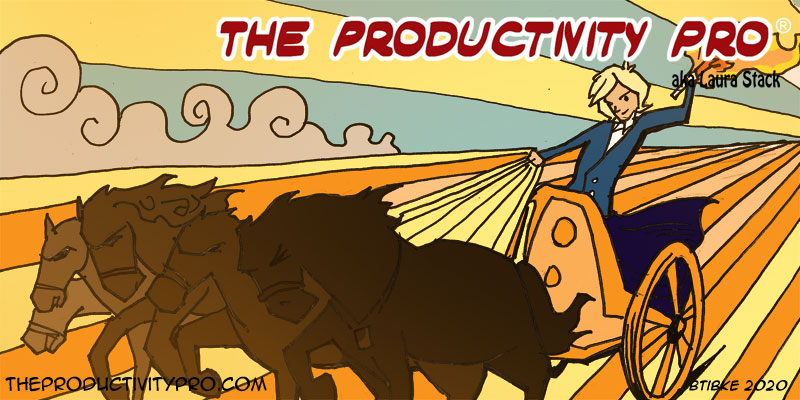“Not all impediments to productivity result from poor organization. Many are psychological… Productivity, or at least how productive you consider yourself, is surprisingly subjective.” —Leigh Buchanan, American business writer and editor
The workings of your mind control everything you do. I don’t talk about that much here, at least not directly, though that truth generally lurks beneath the surface of my tips, suggestions, and advice. Your psychology always effects your productivity. How you think about your work, and whether you care for it at all, makes a huge difference in final performance. That’s why full engagement works so well. Admittedly, there’s also a mind-body link: if you feel poorly on a physical level, you can’t perform as well as when, all else equal, you feel great. So taking care of yourself is also crucial if you want to maintain high productivity.
But even if you’re perfect on both of the above scores, you require certain other things to carry you through and make it easier to stay both physically well and mentally well. Let’s look at a few.
-
- Personal energy. This one’s a combination of the physical and mental domains. If you feel well physically, it will carry over to the mental domain to some extent; but feeling “draggy” mentally can still slow you down overall. The secret here? Understand how to use your personal energy. You’ve often heard (and I’ve sometimes repeated) the “eat-the-frog first thing in the morning” advice. If you’re not a morning person, please ignore that. If your energy peaks just after lunch, eat the frog then. Manage your personal energy like you would time; indeed, managing your energy should form part of your overall scheme for time management, which is really self-management anyhow. But know that mental energy has other components that are not physical — and that’s where these other items come in.
- Willpower. You start with a limited pool of willpower each day, and every decision you make depletes it. This is why at the end of the day, you may feel like your brain hurts, and you want to do nothing more complicated than eat and watch TV. Former President Obama knew he’d make hundreds or thousands of decisions each day, so during his presidency he limited himself to blue or gray suits and ate the same breakfasts — to save his willpower for more important decisions. Use routines, decide on things like your wardrobe in advance, and make your most important work decisions while you still have lots of willpower. Breaks and meals are super-important here, because they can help refill your brain fuel — as can sugary drinks, though some people don’t want to hear that nowadays!
- Motivation. You need a genuine reason to bring your A-game to work. It can be intrinsic, like just enjoying your job, providing for your family, and liking your co-workers. Or it can be extrinsic, like working toward a goal (enough to buy a Ferrari!), a promotion, a raise, a bonus, or simply a pat on the back from your manager. If you have no obvious motivation driving you, then invent or find something—or you might find yourself singing a certain famous Johnny Paycheck song in the middle of the next difficult meeting.
- Alertness. It’s so much easier to produce when you’re wide awake and feeling good (see #1). Consciousness doesn’t necessarily mean alertness; any insomniacs can tell you how hard it is to accomplish anything when you’re mentally dozy. If you get enough sleep and don’t cloud your mind with anything, it’s much easier to perform. Mindfulness also matters. This is a concept related to alertness, though not quite the same. Mindfulness means more than just staying alert; it means staying alert with intent. You’re off automatic when it counts, focused on what’s happening in the moment.
- Optimism. Feeling upbeat about work and not letting things get you down matters more than you might think. It’s not motivation, exactly, but can be one component of it. Embracing your job and engaging fully can help keep you chipper, especially if you know you’re doing meaningful, valuable work. Busy-work won’t cut it, so keep it off your to-do list.
Stop, in the Name of Work
In the modern business world, productivity reigns supreme. One observer, blogger Esther Cohen, calls it “the defining word of the workplace.” And we’ve just about pushed it to its maximum using technology and long hours. But sometimes, how you think about work is more powerful than your other work tools combined. It’s more complicated than what Henry Ford once said, but he wasn’t far off the mark: “If you think you can or think you can’t, you’re right.”
© 2020 Laura Stack. Laura Stack, MBA, CSP, CPAE is an award-winning keynote speaker, bestselling author, and noted authority on employee and team productivity. She is the president of The Productivity Pro, Inc., a company dedicated to helping leaders increase workplace performance in high-stress environments. Stack has authored eight books, including FASTER TOGETHER: Accelerating Your Team’s Productivity (Berrett-Koehler 2018). She is a past president of the National Speakers Association, and a member of its exclusive Speaker Hall of Fame (with fewer than 175 members worldwide). Stack’s clients include Cisco Systems, Wal-Mart, and Bank of America, and she has been featured on the CBS Early Show and CNN, and in the New York Times. To have Laura Stack speak at an upcoming meeting or event, call 303-471-7401 or contact us online



